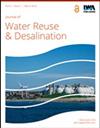Application of a decision support tool for industrial and agricultural water reuse solutions in international case studies
IF 2.3
Q2 Environmental Science
引用次数: 1
Abstract
Treated wastewater is expected to constitute an essential part of the urban water cycle as an additional water resource in water-scarce or densely populated regions in the future. As decisions on the implementation of water recycling measures should always consider local conditions, the project ‘MULTI-ReUse: Modular treatment and monitoring for wastewater reuse’ has developed a comprehensive sustainability assessment tool, designed to support decision-makers in examining the technical feasibility, economic viability, ecological compatibility and social acceptance of alternative service water supply solutions at local level. This article describes the structure of this sustainability assessment tool and its underlying multi-criteria assessment approach based on 23 evaluation criteria. Already in the development phase, the tool was tested in a German and a Namibian case study. Both case studies are presented with a special focus on the technologies used and the results of the analysis with the sustainability assessment tool. Case study testing proved that the tool is applicable in various environmental and societal settings with widely differing climatic conditions, limited resource availability, for varying feed water qualities and water quality requirements. The comprehensive, straightforward assessment approach enabled the local users to identify the most sustainable supply system or strategy for their decision case.在国际案例研究中工业和农业水再利用解决方案的决策支持工具的应用
预计经过处理的废水将作为未来缺水或人口稠密地区的额外水资源,构成城市水循环的重要组成部分。由于实施水循环措施的决定应始终考虑当地的情况,“多重再利用:废水再利用的模块化处理和监测”项目开发了一个全面的可持续性评估工具,旨在支持决策者审查技术可行性,经济可行性,生态兼容性和社会接受替代性供水解决方案在地方一级。本文描述了该可持续性评估工具的结构及其基于23个评估标准的潜在多标准评估方法。该工具已经进入开发阶段,在德国和纳米比亚的案例研究中进行了测试。这两个案例研究都特别侧重于所使用的技术和可持续性评估工具的分析结果。案例研究测试证明,该工具适用于各种环境和社会环境,气候条件差异很大,资源有限,饲料水质和水质要求也各不相同。全面、直接的评估方法使当地用户能够为他们的决策案例确定最可持续的供应系统或战略。
本文章由计算机程序翻译,如有差异,请以英文原文为准。
求助全文
约1分钟内获得全文
求助全文
来源期刊

Journal of Water Reuse and Desalination
ENGINEERING, ENVIRONMENTAL-WATER RESOURCES
CiteScore
4.30
自引率
0.00%
发文量
23
审稿时长
16 weeks
期刊介绍:
Journal of Water Reuse and Desalination publishes refereed review articles, theoretical and experimental research papers, new findings and issues of unplanned and planned reuse. The journal welcomes contributions from developing and developed countries.
 求助内容:
求助内容: 应助结果提醒方式:
应助结果提醒方式:


